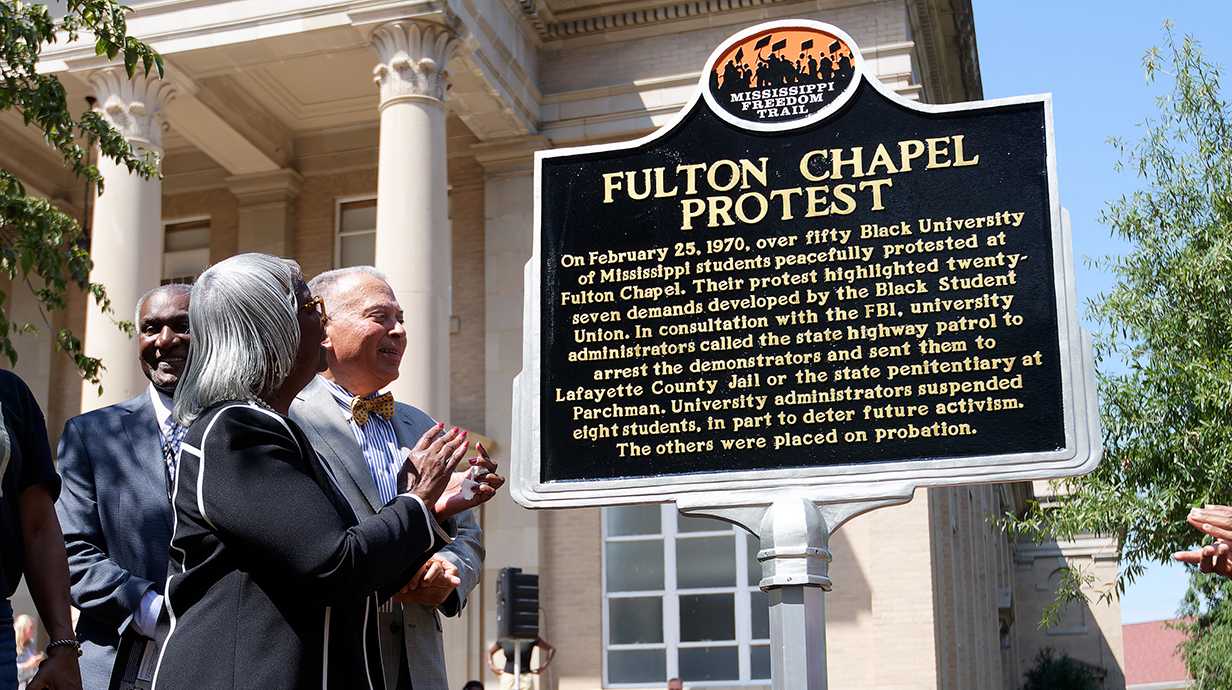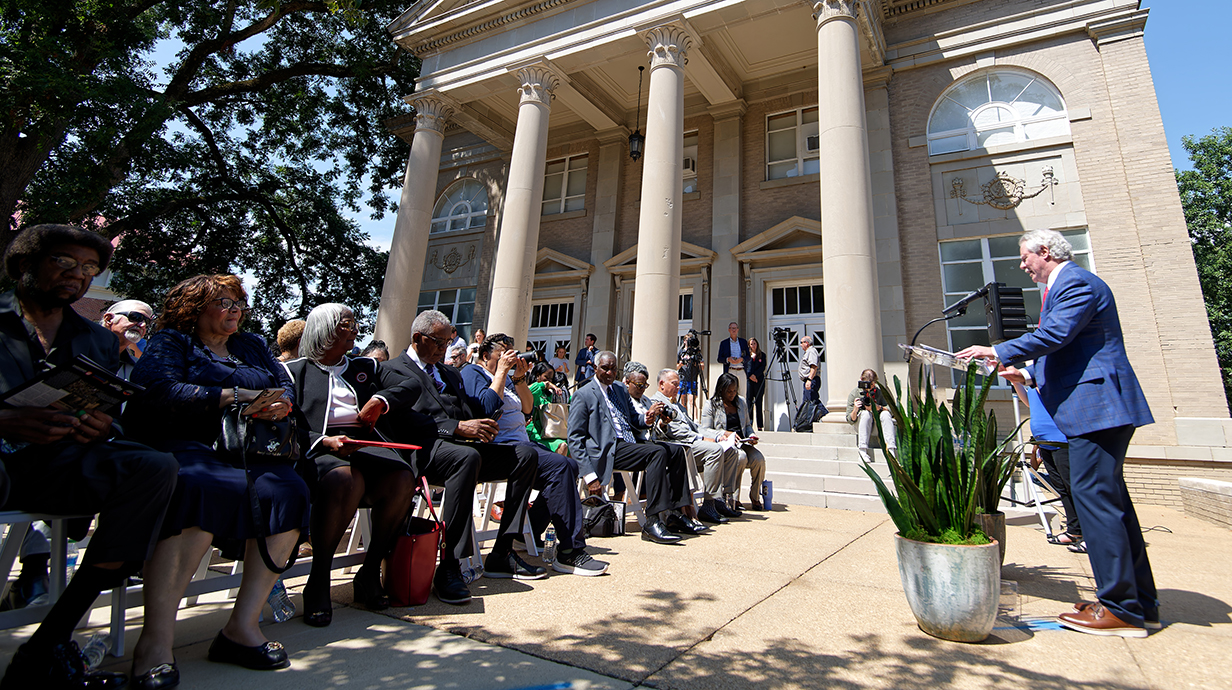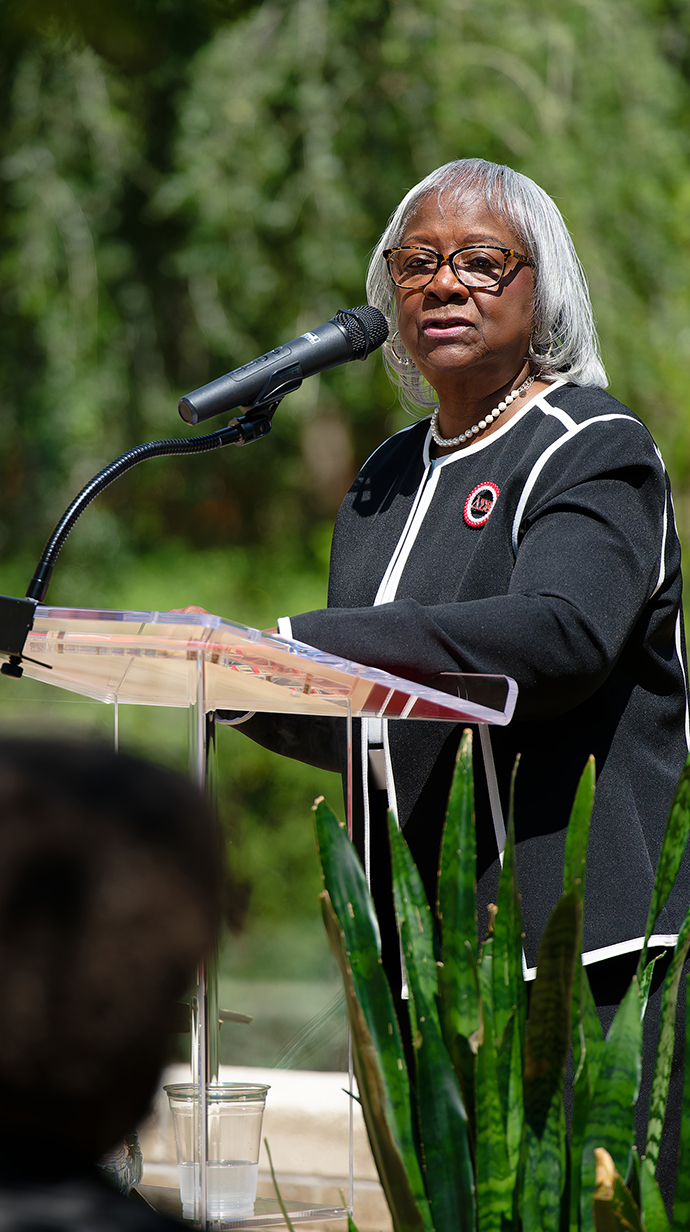Mississippi Freedom Trail Marker Unveiled at Fulton Chapel
University leaders, alumni, students reflect on 1970 protest that sparked lasting change on campus

OXFORD, Miss. – The Mississippi Humanities Council, in partnership with Visit Mississippi, unveiled a Mississippi Freedom Trail marker Tuesday (Sept. 2) at the University of Mississippi in the presence of student leaders who participated in a demonstration 55 years ago that is documented by the plaque.
The new marker near Fulton Chapel commemorates the Feb. 25, 1970, peaceful protest by more than 50 Black students at the auditorium, where they brought attention to 27 demands created by the Black Student Union.
The protest ended with 89 students being arrested and jailed and all but eight being placed on probation by the university. The eight students not on probation were suspended and became known as the Ole Miss 8.

Chancellor Glenn Boyce speaks at a dedication ceremony outside Fulton Chapel for a new Mississippi Freedom Trail Marker on the Ole Miss campus. Photo by Hunt Mercier/Ole Miss Digital Imaging Services
"Genuine leadership is the ability to motivate and inspire others, to stand up for what is right and to have mental toughness," Chancellor Glenn Boyce said. "In that regard, the Ole Miss 8 are powerful examples of this university's legacy of leadership.
"As an educational institution, we share knowledge and inform our community about the events that have shaped our past. This marker connects us to that past, and it encourages the people who pass by it today to learn about our history."
Four of the Ole Miss 8 attended the ceremony: Don Cole, Linnie Liggins Willis, Kenneth Mayfield and Henriesse Roberts.
"It is with a great sense of pride for which I stand here today awaiting the unveiling of the Mississippi Freedom Trail marker, which will enshrine the history of the Ole Miss 8 and 81 into the fabric of this institution in perpetuity," Liggins Willis said.
Despite being denied her degree in 1970 but awarded it later, Liggins Willis is at peace.
"I embrace and acknowledge that I indeed have an alma mater, and it is the University of Mississippi," she said.
The protest brought change to campus. Several of the students' demands were met a few months after the demonstration. This included Jennette Jennings being appointed as the first Black faculty member and the establishment of the African American studies program.

Linnie Liggins Willis shares remarks about her time at the university and how she came to be one of the Ole Miss 8 at a Sept. 2 ceremony at Fulton Chapel. Photo by Hunt Mercier/Ole Miss Digital Imaging Services
The protest and its aftermath have been considered a "watershed event" in the university's story by historian David Sansing.
"It is those moments in history when they (freedoms) are not upheld, when they are not a given, that cause us to pause and realize the importance of these to the people, to the democracy, and to circumstances in which we live," said Noel Wilkin, provost and executive vice chancellor for academic affairs.
"This marker helps to tell that story, to teach that lesson and remind people that when freedoms bestowed on us by the constitution are not upheld, all of us lose something."
The marker provides an opportunity for passersby to learn about Mississippi history that shapes the present and future.
"Members of the Ole Miss 89 community wanted a Mississippi Freedom Trail Marker so that the event, the history of which has largely been kept silent for more than 50 years, came to be part of Mississippi civil rights history," said Ralph Eubanks, writer-in-residence and fellow at the Center for the Study of Southern Culture.
The legacy of the Ole Miss 8 is something from which the community can continue to learn.
"This event reflects a key chapter in our university's history – and the shared responsibility we have in building a campus where every student can thrive," said Shawnboda Mead vice chancellor for student affairs.
Borrowing from the Sam Cooke song "A Change is Gonna Come,' Liggins Willis articulated the occasion.
"It's been a long time coming, and a change has come today," she said.
Top: Don Cole (left), former UM mathematics professor and special assistant to the chancellor for multicultural affairs; Ole Miss alumna Linnie Liggins Willis; and Ralph Eubanks, fellow and writer-in-residence at the university's Center for the Study of Southern Culture, celebrate the dedication of a campus marker commemorating a 1970 demonstration at Fulton Chapel. Cole and Willis are members of the Ole Miss 8, eight Black students who were arrested and expelled for their participation in the protest. Photo by Hunt Mercier/Ole Miss Digital Imaging Services
By
Marisa C. Atkinson
Campus
Office, Department or Center
Published
September 02, 2025
